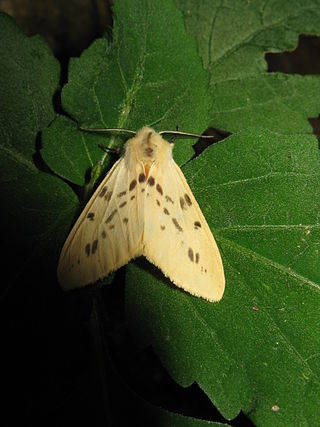
Hypsopygia costalis, the gold triangle or clover hay moth, is a species of moth of the family Pyralidae. It was described by Johan Christian Fabricius in 1775 and is found in Europe. The wingspan is 16–23 mm. The adult moths fly from May to July, depending on the location. The supposed species H. aurotaenialis is included here pending further study.

Lemyra is a genus of tiger moths in the family Erebidae. The genus contains many species from East and South Asia, Sundaland and Australia. It was described by Francis Walker in 1856.

Lemyra alikangensis is a moth in the family Erebidae first described by Embrik Strand in 1915. It is found in Taiwan.

Lemyra inaequalis is a moth of the family Erebidae first described by Arthur Gardiner Butler in 1879. It is found in Japan and Korea.
Lemyra bimaculata is a moth of the family Erebidae. It was described by Frederic Moore in 1879. It is found in eastern India and Nepal.
Lemyra eximia is a moth of the family Erebidae. It was described by Charles Swinhoe in 1891. It is found in southern India.
Lemyra flammeola is a moth of the family Erebidae. It was described by Frederic Moore in 1877. It is found in China.
Lemyra flavalis is a moth of the family Erebidae. It was described by Frederic Moore in 1865. It is found in China, Nepal, India, Bhutan and Myanmar.
Lemyra hanoica is a moth of the family Erebidae. It was described by Franz Daniel in 1953. It is found in Vietnam.
Lemyra hyalina is a moth of the family Erebidae. It was described by Cheng-Lai Fang in 1990. It is found in China in Guangxi and Guangdong.

Lemyra imparilis is a moth of the family Erebidae. It was described by Arthur Gardiner Butler in 1877. It is found in China, Taiwan, Japan and Korea.
Lemyra melli is a moth of the family Erebidae. It was described by Franz Daniel in 1943. It is found in China.
Lemyra neglecta is a moth of the family Erebidae. It was described by Walter Rothschild in 1910. It is found in India, Nepal, Myanmar and China.
Lemyra neurica is a moth of the family Erebidae. It was described by George Hampson in 1911. It is found in India and Bhutan.
Lemyra rubidorsa is a moth of the family Erebidae. It was described by Frederic Moore in 1865. It is found in Pakistan (Kashmir), India and China.
Lemyra rubrocollaris is a moth of the family Erebidae. It was described by Reich in 1937. It is found in China (Jiangsu).
Lemyra spilosomata is a moth of the family Erebidae. It was described by Francis Walker in 1865. It is found in southern India.

Lemyra stigmata is a moth of the family Erebidae. It was described by Frederic Moore in 1865. It is found in China, Pakistan, India, Nepal, Bhutan, Myanmar, Thailand and Vietnam.
Lemyra ypsilon is a moth of the family Erebidae. It was described by Walter Rothschild in 1910. It is found in Sundaland, Java, Borneo and Malaysia (Malacca). The habitat consists of lower montane forests and hill dipterocarp forests.

Thoracophorus costalis, the furrowed rove beetle, is a species of unmargined rove beetle in the family Staphylinidae. It is found in Central America and North America.





